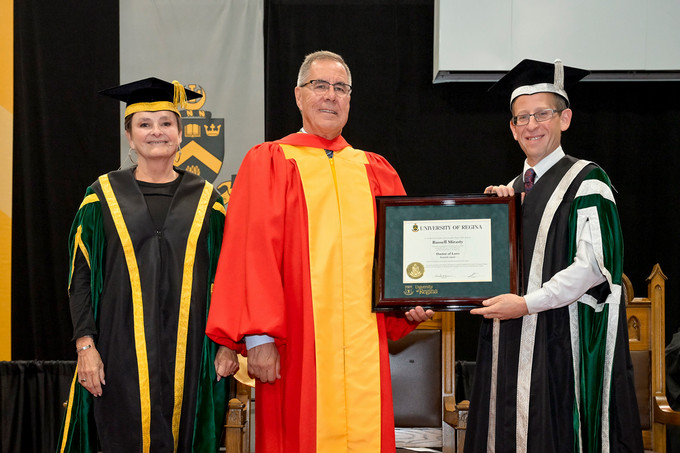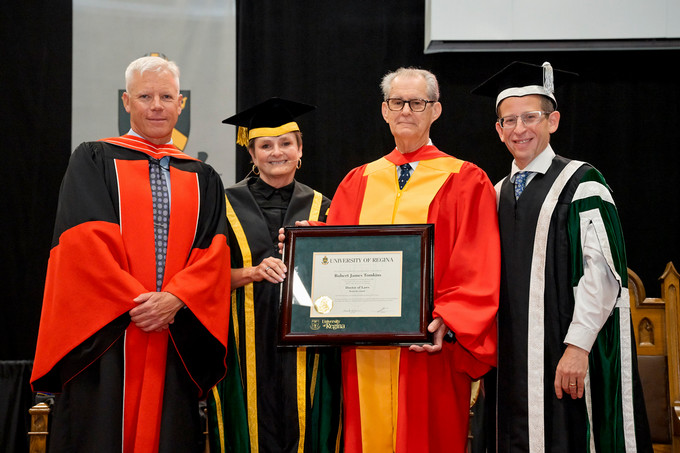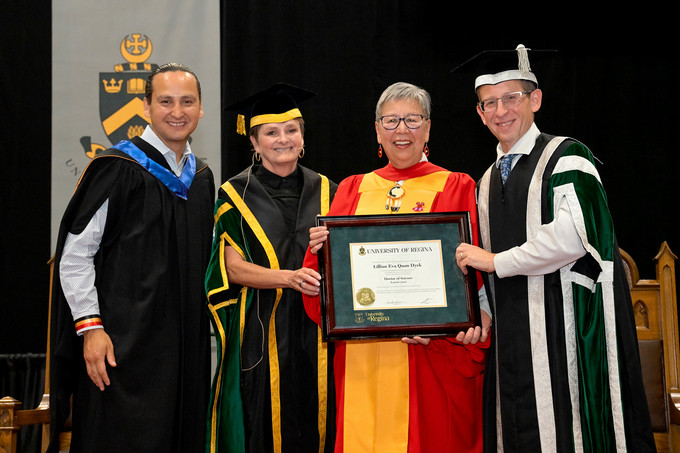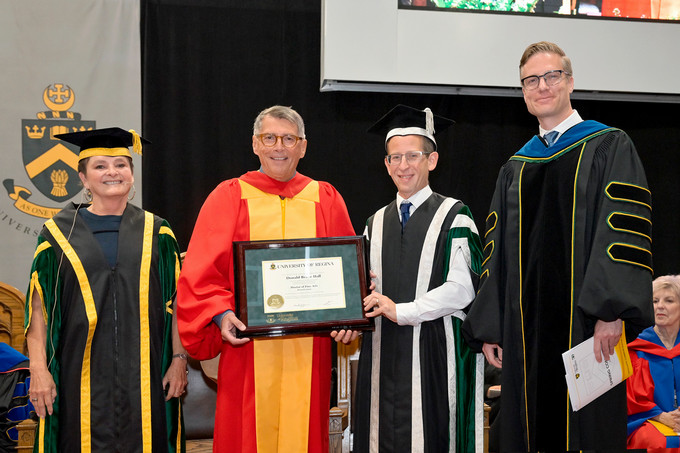
Honorary Degrees
Awarding Honorary Degrees
The University of Regina Act gives Senate and Executive of Council joint authority to approve honrary degree candidates. The Chancellor confers honorary degrees as recommended by the President who makes selections from the approved candidate list.
The Senate by-laws provide for a Joint Committee of Senate and Council on Ceremonies, which recommends appropriate guidelines and criteria for the awarding of honorary degrees, invites, receives and reviews suggestions for candidates to whom honorary degrees might be awarded, and recommends for approval to Senate and Council candidates for honorary degrees.
Principles/Statement of Purpose
An honorary degree is the highest honour the University can bestow. Acceptance of an honorary degree by a candidate brings honour to both the recipient and the University.
Honorary degrees will be conferred at every convocation but not necessarily every ceremony.

Honorary Degree Categories
The University of Regina awards four honorary degrees:
- Doctor of Fine Arts honoris causa (DFA) – awarded in recognition of outstanding achievement in visual or performing arts.
- Doctor of Laws honoris causa (LLD) - awarded in recognition of exceptional service to the University or the community at large. This generic honorary degree is the most frequently awarded.
- Doctor of Letters honoris causa (DLitt) – awarded in recognition of outstanding achievement in the humanities or literature.
- Doctor of Science honoris causa (DSc) – awarded in recognition of outstanding achievement in the pure and applied sciences.
Categories of Nomination
The Ceremonies Committee will take the following considerations into account when selecting candidates:
- A Saskatchewan or prairie figure, well known and respected regionally for distinguished work which has earned them a reputation in public service.
- A distinguished person from a professional field or the creative arts field who is recognized as having achieved a reputation for excellence.
- A scientist, humanitarian, public servant or public figure who is recognized nationally or internationally for distinguished work and reputation.
- A visionary leader whose presence at Convocation would be inspiring to the graduating class.
On occasion, special efforts may be made to mark the time or circumstance by placing special emphasis on some particular field of endeavour.
Exclusion List
The following persons are not eligible for consideration for an honorary degree:
- current members of the Board of Governors or Senate (excluding Chancellors Emeriti);
- current or recent members of the faculty or staff of the University;
- current students; and
- holders of elected office at any level (such as municipal, provincial, or federal)
Nomination Forms
Nomination Process
Any member of the University community or the public may put forward a nomination. The nomination must be signed by the nominator and may include up to three letters of support. Nominators should declare on the nomination form the basis for their selection. Nominators would not normally be members of the nominee’s immediate family.
Nominations will be accepted at anytime throughout the year. In order for a nominations to be considered at the Ceremonies Committee annual meeting (usually in May), applications must be submitted prior to March 31st.
Guidelines for Preparation of Nominations
Nominations should follow the format stipulated on the Nomination Form and include the following:
- The name of the nominee and complete contact information.
- Biographical information on the candidate, i.e. degrees, curriculum vitae, etc.
- A summary statement on why the candidate is being nominated.
- Information on the nominator
Please download the Nomination Form (Word Document). Once you have completed the form, submit it to the Joint Committee of Senate and Council on Ceremonies.
Contact Us
Please address and submit nominations to:
Joint Committee of Senate and Council on Ceremonies
Administration-Humanities Building, Room 510
University of Regina
Regina, SK S4S 0A2
Email: University.Secretary@uregina.ca
Telephone: 306-585-4956
Honorary Degree Protocol
The Ceremonies Committee will consider only complete nominations. The Committee will either recommend the nominee to Senate and Executive of Council for inclusion on the approved candidate list, or reject the nomination. If a nomination is rejected the file is destroyed.
Information on the action of the Ceremonies Committee regarding nominations will remain confidential.
The Senate and Executive of Council will, at their next meeting, receive the names of those recommended for approval and will vote on each name separately at an in-camera session. In unusual cases, such as a Special Convocation, such voting may take place by mail or confidential e-mail ballot. Those approved for the awarding of a degree will be added to the list of “approved” candidates, which is maintained by the University Secretary.
Prior to each Convocation ceremony, the President will review the approved list of honorary degree candidates and will chose the recipients to be honoured at the Convocation. Wherever practical, honorary degrees will be awarded within five years of their approval by Senate and Executive of Council.
If a nominator informs the nominee, or any one else, about the nomination, it must be on the basis that such communication is to be treated as strictly confidential communication and on the basis that such nomination is but a first step in a process which may or may not result in an honorary degree being awarded. The University will not release the outcome of any individual nomination, except by making a public announcement of the honorary degree recipients for a particular Convocation. The names approved by Senate and Executive of Council will not be made public until this time. Members of Senate and Executive of Council are to treat as confidential any information regarding approved candidates.
The University Secretary will determine the timing of the public announcement.
Honorary degree recipients may be invited to give a Convocation address but can decline the invitation to do so.
Honorary degrees are not awarded in absentia. An exception may be made only when an honorary degree recipient has accepted and arrangements have been made for its awarding but extenuating and unforeseen circumstances (such as sudden ill health or inability to travel) prevent the individual’s attendance.
Honorary degrees are not awarded posthumously. An exception may be made only when the honorary degree recipient has accepted and arrangements have been made for its awarding prior to the individual’s death.
The citation for the honorary degree is prepared by the University Secretary, in consultation with the President and in partnership with the presenter. The Chancellor confers the honorary degree, the University Secretary hoods the honorary degree recipient, and the President presents the framed honorary degree parchment.
Honorary degree recipients wear a scarlet wool gown trimmed with gold silk around the collar and down the front. The honorary degree hood, which is presented to the honorary degree recipient at the ceremony, has a shell of scarlet wool lined with gold silk with an inverted green silk chevron and colors distinctive to the degree.
- DFA – red with gold lining and a green chevron in the lining, and a narrow white and pink chevron above the green chevron;
- LLD– red with gold lining and a green chevron in the lining;
- DLitt– red with gold lining and a green chevron in the lining, and a narrow white chevron above the green chevron; and,
- DSc– red with gold lining and a green chevron in the lining, and a narrow mint green and emerald green chevron above the green chevron.
The Senate, acting on the recommendation of Council or on its own initiative but after receiving a report from Council, may revoke degrees (including an honorary degree), diplomas, certificates or distinctions conferred by the University and all privileges connected therewith from any holder of the same:
- who shall have been convicted of any criminal offence which shall be held (by the Council) to be of an immoral, or scandalous or disgraceful nature;
- whose membership in a Professional Society has been revoked for misconduct; or
- whose conduct, in the opinion of the Senate, shall constitute a breach of any agreement made with the University as a condition of the conferment of such degree or degrees, diplomas, certificates or distinctions (including institutional honours).
The Senate may restore the degree, diploma, certificate or distinction or privileges revoked by Senate without further examination, on cause being shown, and after report by Council.
Honorary Degree Recipients
2025 Spring Summer Honorary Degree Recipients

Dr. Russell Mirasty
The Honourable Russell Mirasty, a member of the Lac La Ronge Indian Band and fluent Cree speaker, is best known as Saskatchewan’s first Indigenous Lieutenant Governor. Born and raised in La Ronge, he grew up immersed in Cree culture, laying the foundation for a lifetime of public service and leadership.
Mr. Mirasty joined the RCMP in 1976 as one of only two Indigenous cadets at the time. Over a distinguished 36-year career, he served in seven provinces and rose to the rank of assistant commissioner — the first Indigenous person to serve as a commanding officer. He was known for advancing respectful policing, cross-cultural understanding, and the mentorship of Indigenous recruits.
Following his RCMP retirement in 2013, Mr. Mirasty continued his public service through provincial and national initiatives focused on education and youth. He co-led a province-wide Student First Engagement process on behalf of the Ministry of Education that would eventually inform a new provincial K-12 education strategy.
In 2019, Prime Minister Justin Trudeau appointed Mr. Mirasty as Lieutenant Governor of Saskatchewan. His term, which concluded in 2024, was widely praised for its humility, accessibility, and emphasis on reconciliation, youth empowerment, and literacy. His ability to speak Cree during formal occasions added powerful representation and inclusivity.
Together with his wife, Donna, Mr. Mirasty remains active in community work, inspiring a new generation of leaders grounded in cultural pride, service, and reconciliation. His legacy is one of integrity, compassion, and a deep commitment to the well-being of all Saskatchewan people.
Mr. Mirasty received an Honorary Doctor of Laws honoris causa (LLD) on June 11, 2025 at Spring Convocation.

Dr. Jim Tomkins
Dr. Jim Tomkins has been a cornerstone of the University of Regina for over five decades, serving as a mathematics professor, administrator, and leader. His connection with the University began in 1963, working on the construction of the then new campus.
After earning a mathematics degree from the University of Saskatchewan and a master’s and PhD in statistics from Purdue University, Dr. Tomkins returned to Regina in 1969 to join the faculty of the Department of Mathematics and Statistics. Over the next 37 years, he held numerous roles, including Vice- President (Administration) from 1998 to 2005, and was seconded to the Government of Saskatchewan as a senior policy analyst in post-secondary education from 1994 to 1998.
He served as the University of Regina’s sixth President and Vice-Chancellor from 2007 to 2008, and as its eighth Chancellor from 2013 to 2019, presiding over Convocation ceremonies and serving on the Board of Governors.
Deeply committed to community service, Dr. Tomkins has been a board member of Regina Palliative Care, a council member of the Canadian Red Cross Society, and a trustee of the Saskatchewan Healthcare Employees’ Pension Plan.
In 2023, Dr. Tomkins and his wife, Dr. Lynn Tomkins, received the Outstanding Philanthropist Award from the Association of Fundraising Professionals South Saskatchewan Chapter. Through their foundation, they have supported organizations such as the Regina Transition House and Mosaic Stadium.
His legacy is defined by his dedication to education, leadership, philanthropy, and service to both the University and community.
Dr. Tomkins receives an Honorary Doctor of Laws honoris causa (LLD) on June 12, 2025 at Spring Convocation.

Dr. Lillian Eva Quan Dyck
The Honourable Dr. Lillian Eva Quan Dyck, OC, is a trailblazing neuroscientist, professor, and former Senator whose life has been dedicated to science, education, and advocacy for Indigenous and women’s rights.
Born in North Battleford, she is of Cree and Chinese heritage and a member of the George Gordon First Nation. Dr. Dyck earned multiple degrees from the University of Saskatchewan, including a PhD in biological psychiatry – becoming the first Indigenous woman in Canada to earn a PhD in the sciences.
At the University of Saskatchewan, she served as a professor of psychiatry and associate dean of Graduate Studies. Her research explored neurotransmitters related to mental health conditions such as Alzheimer’s, depression, and schizophrenia. As one of the few women in science in the 1980s, she became a passionate advocate for equity, mentoring Indigenous and women students and co-chairing the Women’s Studies Research Unit.
Dr. Dyck was appointed to the Senate of Canada in 2005, making history as the first female Indigenous Senator and the first Canadian-born Senator of Chinese descent. During her 15-year tenure, she chaired the Senate Committee on Aboriginal Peoples and championed issues such as missing and murdered Indigenous women and sex-based discrimination in The Indian Act. Her work contributed to landmark legislative reforms.
She has received numerous accolades, including the National Aboriginal Achievement Award and the YWCA Woman of Distinction Award.
Since retiring in 2020, Dr. Dyck continues to inspire through her legacy of advocacy, academic excellence, and unwavering pursuit of justice and equality.
Dr. Dyck receives an Honorary Doctor of Science honoris causa (DSc) on June 12, 2025 at Spring Convocation.

Dr. Don Hall
For more than 40 years, Don Hall served as the University of Regina’s photographer, capturing campus life with remarkable skill, artistry, and heart. From Convocations to athletic events, his photographs documented the University’s evolution and helped shape its public image. His work appears in countless recruitment materials, publications, and exhibitions, creating a powerful visual archive of the University’s history.
Born and raised in Saskatchewan, Mr. Hall studied at the University of Saskatchewan’s Regina Campus from 1968 to 1970 and completed his photography training at the Northern Alberta Institute of Technology.
Known for his ability to connect with people, Mr. Hall had a calming, respectful presence that put subjects at ease — whether first-year students or visiting dignitaries. The trust he built helped him craft thousands of memorable images that tell both personal and institutional stories. Mr. Hall taught photography at the University from 1976 until his retirement, a role that brought him much satisfaction.
Outside the University, he earned a reputation as one of Saskatchewan’s leading fine art photographers. His images of rural and urban landscapes, architecture, and portraits have been widely exhibited across Canada and are held in major collections including the Glenbow Museum, Remai Modern, Mackenzie Art Gallery, and Canada Council Art Bank.
He also contributed as an editor and curator, co-editing Between Time and Place: Contemporary Saskatchewan Photography in 1989 and appearing in the documentary Landscape as Muse in 2004.
Mr. Hall retired in 2016, leaving a legacy as a gifted artist, mentor, and storyteller. Known for his warmth, humility, and generosity, his work continues to inspire and connect people to place, memory, and meaning.
Mr. Hall receives an Honorary Doctor of Fine Arts honoris causa (DFA) on June 13, 2025 at Spring Convocation.
2024 Fall Honorary Degree Recipients

Chris Getzlaf
U of R alumnus and Saskatchewan Roughrider legend Chris Getzlaf played with the Regina Thunder and then the University of Regina Rams. Drafted by the Hamilton Tiger-Cats in 2007, he was soon traded to the Riders, where he played in his hometown for nine and a half years of his outstanding 11-year CFL career.
His legacy with the Riders includes two Grey Cups (2007 and 2013). In the 2013 Grey Cup hosted in Regina, he was named the Most Outstanding Canadian. He remains fifth all-time in receiving yards
for the Roughriders and was named to the team’s SaskTel Plaza of Honour in 2021.
Getzlaf has strong community ties and serves on the Board of Directors of the Saskatchewan Roughrider Foundation. He has traveled across Saskatchewan for speaking engagements, was
involved in the Red Cross’s Imagine No Bullying Campaign, ran the Getzlaf and Friends Charity Golf Tournament raising more than $200,000 for the Children’s Wish Foundation, and is involved in the Regina Chapter of 100 Men Who Care. He received the Red Cross Young Humanitarian Award and Mosaic Outstanding Community Service Award for his commitment to giving back. Getzlaf says, “When the award was explained as recognition of exceptional professional or personal accomplishments, and service to community, it was extremely flattering. Knowing that many peers and highly educated individuals view me in a light to be a recipient of such an honour is an amazing feeling.”
Chris Getzlaf received an honorary Doctor of Laws honoris causa (LLD) on October 17, 2024.

Ryan Getzlaf
Ryan Getzlaf’s success as a junior hockey player translated into an exceptional career with the Anaheim Ducks.
During his four-year junior hockey career with the Calgary Hitmen, Getzlaf was a member of the gold medal-winning 2003 International Ice Hockey Federation U18 World championship team. In 2005, he was a member of the Canadian World Junior team that won the gold medal. Making his NHL debut in 2005, Getzlaf played his entire NHL career, 17 seasons, with the Anaheim Ducks. He served as captain of the team for 12 seasons, and was a member of the 2007 Stanley Cup winning team.
Active in a variety of charitable endeavours, Getzlaf created the Anaheim Ducks Learn to Play program for children, and the Getzlaf’s Gamers program that helps underprivileged children attend Calgary Hitmen games. He and his wife Paige host the Annual Getzlaf Golf Shootout which has raised $5.7 million for CureDuchenne, a foundation supporting research to cure Duchenne Muscular Dystrophy.
Getzlaf says, “Receiving this honorary degree from the University of Regina, in the city where I was born and grew up in, is quite humbling. It means that my career as a professional athlete, and my efforts to give back to the community at large, are being acknowledged by respected and highly accomplished academics and community members who have decided to grant this huge honour to me.”
Ryan Getzlaf received an honorary Doctor of Laws honoris causa (LLD) on October 17, 2024.